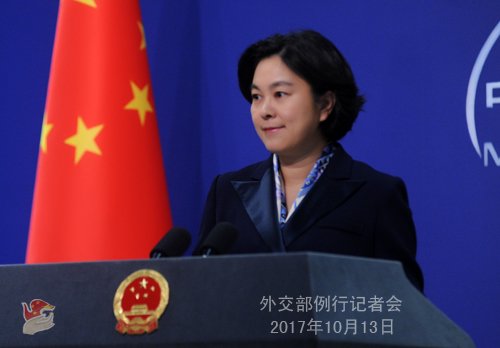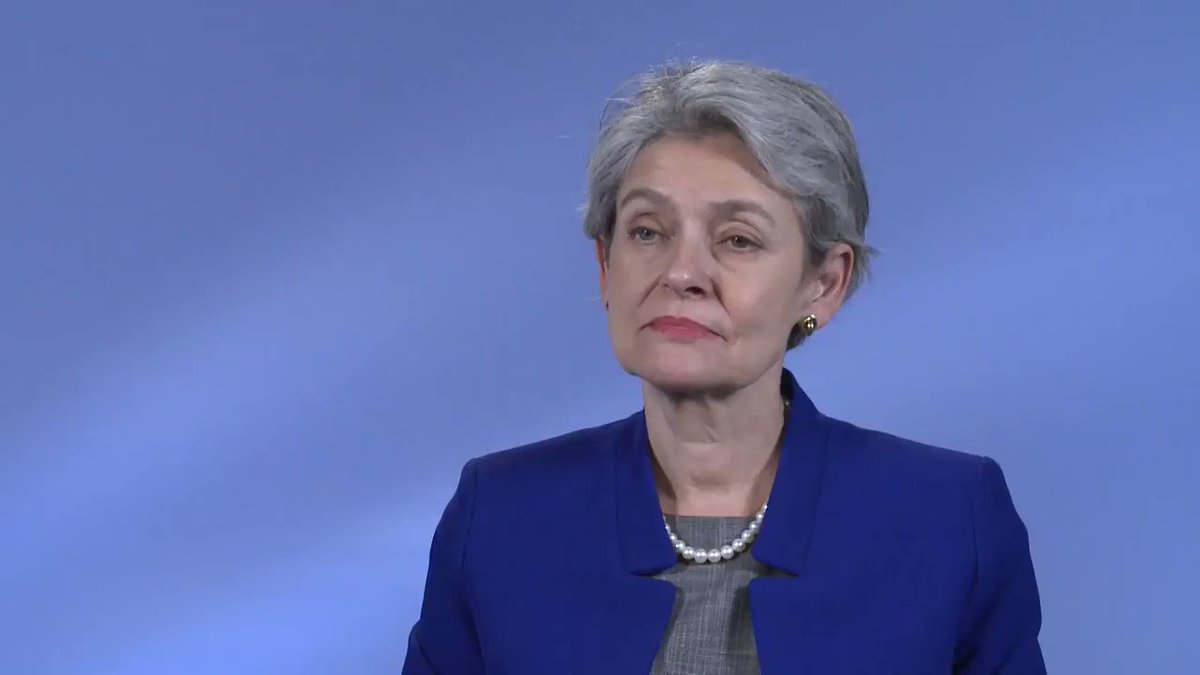Friday, October 13th., 2017
'UNESCO Just the Beginning': China Set to Take US's Place in Int'l Organizations
The
US decision to withdraw from UNESCO has prompted shock and concern from
the international community. Observers say the move hints at
Washington's growing international isolation, and that the vacuum will
quickly be filled by China.
UNESCO director general Irina Bokova expressed regret over the US move,
saying
the organization "has never been more important to the United States,
and the United States has never been more important to UNESCO." UN
General Assembly President Miroslav Lajcak warned that the US move
"could have adverse impacts" on the agency's work.
Russia,
France and
Germany have expressed their own concerns with the decision.
The Chinese Foreign Ministry, meanwhile, confirmed that Beijing would
continue to actively participate in the body, notwithstanding
Washington's decision. "UNESCO's goals are to promote international
cooperation in the fields of education, science and culture,
inter-civilizational understanding and the protection of world peace.
China hopes that all countries will be able to continue to contribute in
this area. We will continue to actively participate in UNESCO's work,
and to support the organization," Foreign Ministry spokeswoman Hua
Chunying
said Friday at a press briefing
.
Επαληθευμένος λογαριασμός @XHNews
China's position has led to speculation about
whether Beijing will use the opportunity granted by the US move to flex
its diplomatic muscles. Oddly enough, on the same day that Washington
announced its decision, Chinese diplomat Dr. Qian Tang, who was
considered to have good prospects for taking the job of UNESCO director
general when Bokova completes her term in November, officially
withdrew
his candidacy. This leaves Egypt's Moushira Khattab, Qatar's Hamad
al-Kawari and France's Audrey Azoulay in the running for the job.
©
REUTERS/ Philippe Wojazer
Nonetheless,
observers say that amid the US's general retreat from international
affairs under President Donald Trump, including the US withdrawal from
and abrogation of treaties signed by the Obama administration, China has
a chance to use its soft power to gain influence internationally,
bringing it in line with its growing economic, political and military
strength.
In an
interview
for Foreign Policy magazine just last week, Dr. Qian seemed to confirm
that this was Beijing's policy when he said that "China wants to fulfill
its global responsibility and contribute to peace and development at a
global level," with UNESCO being "a good platform for this."
In recent years, more and more Chinese
representatives have come to hold senior positions in international
organizations including the World Bank, Interpol, the UN's Industrial
Development Organization, the International Civil Aviation Organization
and the International Telecommunication Union. In the hard power
department, China in recent years has committed more troops to UN
peacekeeping operations than any other permanent member of the Security
Council, contributing over 2,600 troops in 2016.
©
AFP 2017/ ALBERT GONZALEZ FARRAN
Peacekeeping
troops from China, deployed by the United Nations Mission in South
Sudan (UNMISS), patrol outside the premises of the UN Protection of
Civilians (PoC) site in Juba on October 4, 2016
US Turn to Neo-Isolationism?
In addition to the China factor, Russian observers believe that the
US's decision on UNESCO is a symptom of a broader issue – the US's
declining influence around the world. Commenting on the withdrawal,
Russian Senator Alexei Pushkov suggested that President Trump seems
trapped in a Catch-22 situation: "By leaving UNESCO, the US is opting
for self-isolation. This is their reaction to the decline of US
influence around the world. By leaving, the US will only further
aggravate the crisis of its image," the senator
wrote.
The senator
stressed
that there was no real reason for concern over the US decision,
particularly given that Washington hasn't paid into UNESCO since 2011.
More serious, the senator noted, was the
prospect
that the UNESCO decision may be the first step toward a broader US
break with the UN. In that light, Pushkov wrote, "It's time to think
about moving its headquarters to Vienna or Geneva. This is no longer a
fantastical idea."
©
AP Photo/ Julie Jacobson
Pedestrians
walk by United Nations Headquarters, lit up in blue light, a day in
advance of the 70th Anniversary of the U.N., in New York City. File
Photo.
Pushkov's concerns were echoed by Sergei Sudakov, a professor at the
Moscow State Institute of International Relations, Russia's top
diplomatic school. Speaking to Sputnik, the observer recalled that
President Trump had already repeatedly indicated that the US should stop
financing the UN.
The
UNESCO decision, according to the analyst, was probably based on the
calculation that it would be the most painless for the US, given that
few world heritage sites are located in the United States itself.
"The US is now slowly embarking on a path of
localization and introducing the principles of mild isolationism. This
includes belt-tightening and reducing spending on both NATO and the UN.
UNESCO is just the start," Sudakov said. Trump, in the observer's view,
will continue to gradually reduce US contributions to regional and
international political and security organizations and direct them
toward domestic spending.
University of San Francisco international relations professor Stephen Zunes agreed with this assessment,
telling Sputnik
that Washington's "bizarre" decision underscores the US's growing
international isolation. "It reflects more negatively on the United
States than on UNESCO," he stressed.
Finally, political science professor Alexander Gusev told Sputnik
that the UNESCO decision was just the latest in a string of moves by
Washington to isolate itself, starting with the Paris climate agreement
and finishing with the possible US withdrawal from the
internationally-agreed Iran nuclear deal.
12:34 μ.μ. - 12 Οκτ 2017
As far as UNESCO is concerned, Gusev stressed
that "in the eyes of the world community, US standing has been largely
undermined; the credibility of the president has been shattered. It's
impossible to describe what the US is now doing with anything but
derision. … I think that the United States is driving itself into a dead
end."
The US will pull out of the United Nations Educational, Scientific
and Cultural Organization (UNESCO) – the agency which designates and
maintains world heritage sites, supports literacy, potable water,
environmental protection and disaster preparedness programs, on December
31, 2018. Washington has cited an "anti-Israel bias" as the main reason
for the withdrawal. Tel Aviv followed the US and
announced its own preparations to withdraw.











